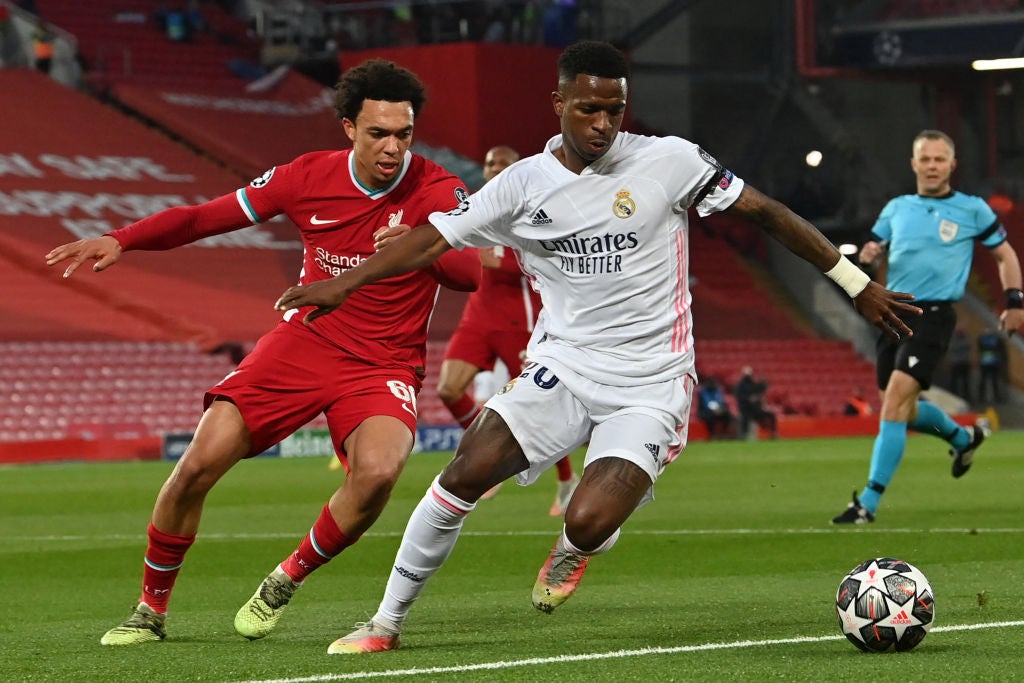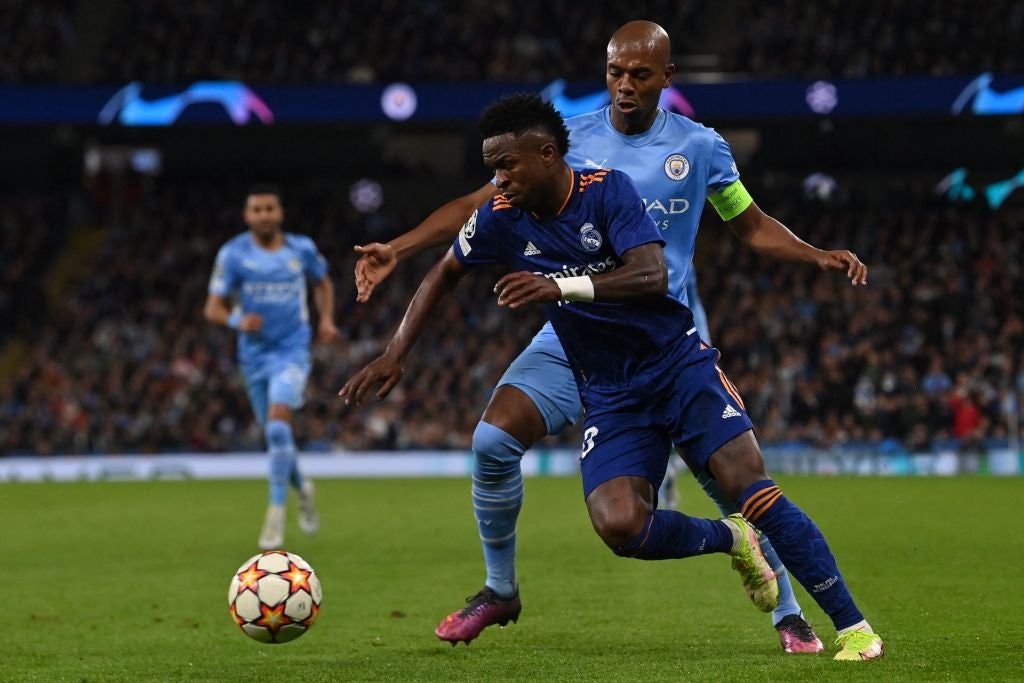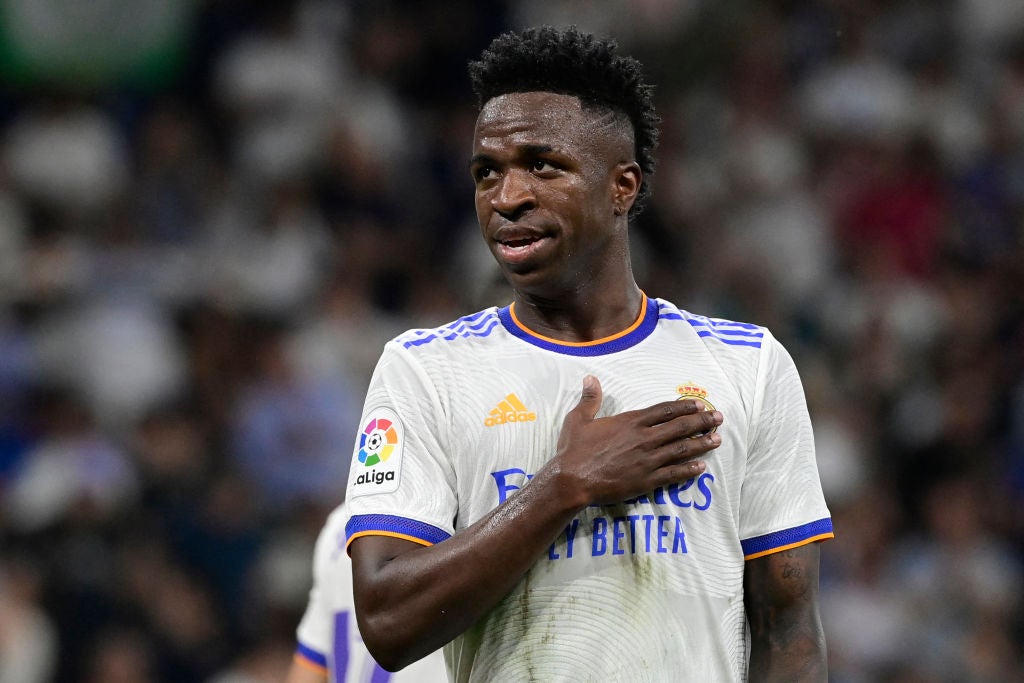Battle between Trent Alexander-Arnold and Vinicius Junior set to decide Champions League final
The Real Madrid forward has been one of the most improved players in Europe this season and is the perfect weapon to exploit Liverpool’s style of play in Paris

Your support helps us to tell the story
This election is still a dead heat, according to most polls. In a fight with such wafer-thin margins, we need reporters on the ground talking to the people Trump and Harris are courting. Your support allows us to keep sending journalists to the story.
The Independent is trusted by 27 million Americans from across the entire political spectrum every month. Unlike many other quality news outlets, we choose not to lock you out of our reporting and analysis with paywalls. But quality journalism must still be paid for.
Help us keep bring these critical stories to light. Your support makes all the difference.
That Liverpool are a better team than Real Madrid is a fairly uncontroversial point ahead of this year’s Champions League final. The consensus is that they will have the edge in many of the individual match-ups across the pitch at the Stade de France. There is no easy way to stop Jurgen Klopp’s side from playing their game. There is an obvious way to hit them back, though.
And in Paris, they will come up against the opponents who were responsible for their most recent Champions League exit in April of last year. Liverpool were short of any of their first-choice centre-backs then, due to the freak run of injuries that made last season the most difficult that Klopp has experienced in six and a half years at Anfield. Their exit at the quarter-final stage to Madrid was not especially surprising given those wider difficulties.
No player did more to bring about that exit, though, than Vinicius Junior. By repeatedly finding space in behind Trent Alexander-Arnold down Liverpool’s right, he scored twice in Madrid’s 3-1 first leg win and had chances to settle the tie once and for all in the goalless draw at Anfield. It is easy to read too much into those games. That was a different Liverpool. Yet it was also a different Vinicius.
Those two goals in last season’s first leg made for a third of his total in all competitions from 49 appearances. In other words, approximately one goal every eight games. Over La Liga seasons, he had never scored more than three times in each. Doubts were only mounting over a player who arrived at 18-years-old as one of the most exciting young prospects in South America and the second-most expensive Brazilian player of all time behind Neymar.
Those doubts have now all but vanished and this year, Vinicius has a case to be the most improved player in European football, becoming Madrid’s next most influential figure behind the irrepressible Karim Benzema. In 51 appearances, he has 21 goals - better than one in every two and a half games. The second half of his campaign has not been as strong as the first but a hat-trick against Levante earlier this month crowned a breakout year.
That leap in production has come despite Vinicius playing more like a traditional winger than the inside forwards that dominate the modern game, with his main role under Carlo Ancelotti being to move the ball from one end of the pitch to another. Vincius has carried the ball up the pitch and into the penalty area more often than practically anyone else in Europe’s five major leagues over the past year. He is Madrid’s out ball, the conduit through which they counter-attack.
This threat on the break conditioned both legs of the semi-final against Manchester City, only in different ways each time. It was Madrid’s release valve during the long spells of City pressure during the first leg at the Etihad and eventually forced them to slow the frantic pace at which they started. His goal, featuring that dummy-nutmeg of Fernandinho, was the second in open play that night came down City’s troubled right-hand side.

In the second leg, Kyle Walker was rushed back into the starting line-up from an ankle injury. Despite him only being half fit, Walker’s recovery speed proved to be the ideal defence against Vinicius and Madrid’s greatest threat in transition was quiet that evening, even after the City right-back’s 72nd-minute withdrawal. None of Madrid’s six goals across the two games were scored while Walker was on the pitch. Liverpool, though, have a different profile of right-back.
Alexander-Arnold’s defending often comes under the microscope but, if anything, the few poor moments he suffers are often a product of Liverpool’s style of play. Klopp’s adventurous positioning of his full-backs - coupled with the key additions of an authoritative centre-half who is capable in possession and a goalkeeper comfortable with coming off his line - transformed this team from top-four contenders into one of the very best in the world.
Alexander-Arnold’s development into a world class playmaker is another key factor and his range of passing means he takes up even more unconventional positions than Andy Robertson on the opposite side, often stepping into more central areas to conduct play in the final third. It is no secret that Liverpool concede space down their right flank as a result and lots of it. Their opponents often target that area of the pitch. Few successfully manage to exploit it.

Madrid did, though, twice scoring with attacks down that side in last season’s quarter final. Each goal was fashioned by a brilliant Toni Kroos ball over the top, but Vinicius’ positioning between Alexander-Arnold and Nat Phillips created just as much panic for the first, leaving both Liverpool defenders stranded as he penetrated the large expanse behind them. It was Ferland Mendy’s turn to do similar on the second, with his run compelling Alexander-Arnold into a careless header back towards his own goal that was turned in by Marcos Asensio.
That was Zinedine Zidane’s Madrid rather than Ancelotti’s but the blueprint is likely to remain the same. It is far from a guarantee, though, and still a difficult plan to pull off. If Liverpool’s press is functioning, Kroos will not be given the same time to guide Madrid’s play into that space. Liverpool’s right-sided central midfielder - likely Jordan Henderson, who was missing for that quarter-final first leg - will cover Alexander-Arnold’s bursts forward. Alexander-Arnold himself can pin Vinicus back by positioning himself high up.
Yet over the course of a transformational season at an individual level, Vinicius has shown aspects of his much-improved game that are almost perfectly suited to exploiting the inherent gamble in Klopp’s style of play. Liverpool have many different ways to beat Madrid. Madrid may only have one way to beat Liverpool. But their most recent meetings suggest that the battle between Vinicius and Alexander-Arnold is likely to be where this Champions League final is decided.
Join our commenting forum
Join thought-provoking conversations, follow other Independent readers and see their replies
Comments